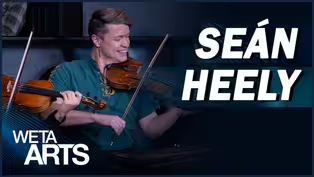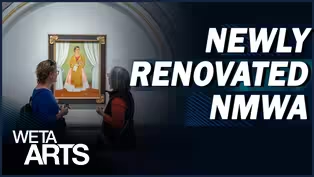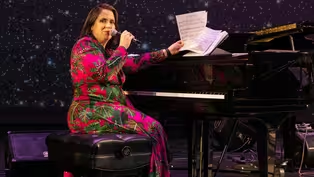
Meet DC Jazz Musician Amy Bormet
Clip: Season 11 Episode 6 | 8m 42sVideo has Closed Captions
WETA Arts profiles D.C. pianist Amy Bormet.
Pianist Amy Bormet founded the Washington Women in Jazz Festival to promote women musicians in a traditionally male-dominated field. Through performances, workshops, and collaborations, Bormet and other female jazz musicians strive to empower and inspire the next generation of jazz artists while fostering a sense of community and activism in the nation's capital.
Problems playing video? | Closed Captioning Feedback
Problems playing video? | Closed Captioning Feedback
WETA Arts is a local public television program presented by WETA

Meet DC Jazz Musician Amy Bormet
Clip: Season 11 Episode 6 | 8m 42sVideo has Closed Captions
Pianist Amy Bormet founded the Washington Women in Jazz Festival to promote women musicians in a traditionally male-dominated field. Through performances, workshops, and collaborations, Bormet and other female jazz musicians strive to empower and inspire the next generation of jazz artists while fostering a sense of community and activism in the nation's capital.
Problems playing video? | Closed Captioning Feedback
How to Watch WETA Arts
WETA Arts is available to stream on pbs.org and the free PBS App, available on iPhone, Apple TV, Android TV, Android smartphones, Amazon Fire TV, Amazon Fire Tablet, Roku, Samsung Smart TV, and Vizio.
Providing Support for PBS.org
Learn Moreabout PBS online sponsorshipJazz is a profound part of the history of Washington, D.C., with clubs that welcomed the greats and named its premier arts public school, the Duke Ellington School of the Arts, after one of its own native sons.
♪ Let's make a change... ♪ Curry, voice-over: When pianist Amy Bormet began at Ellington, she didn't imagine she would become not only a musician, but also an advocate for women.
♪ Oh ♪ Man: Amy, how you feeling?
Good?
Good.
The vocals sound really trebly up here.
♪ Curry, voice-over: It's the first and only rehearsal before the first performance of a new big band called the Celestial Spang-A-Lang.
Spang-a-Lang is a beat pattern for jazz drums, and "celestial" refers to the all-star performers at tonight's gig.
♪ Bormet: This is gonna be solid, and everyone coming in are, like, very phenomenal improvisors and also really great session readers.
♪ We pick people who function well under pressure.
♪ Curry, voice-over: Celestial Spang-A-Lang's performance is part of the month-long Washington Women in Jazz Festival, founded by Bormet.
Bormet: I started Washington Women in Jazz in 2011, and I had just done a residency at the Kennedy Center... ♪ Rising heat ♪ ♪ Bormet: and I wanted to be on bigger jazz festivals.
I started looking at them... ♪ and there'd be no women instrumentalists anywhere on the schedule, even within the bands.
♪ I knew all of these women who were performers here, and I said, "Well, what if I create something "that we can collaborate on to gain an audience for women musicians?"
This is my big hit, had it played on the radio.
♪ Let's make a change ♪ ♪ For the better ♪ ♪ No more excuses ♪ ♪ And no more lies ♪ ♪ Let's make a change... ♪ Curry, voice-over: As a child in Oregon, Bormet learned to play on her grandmother's piano.
Jazz and I have had a beautiful, beautiful relationship.
I grew up listening to Duke Ellington, Count Basie, Ella Fitzgerald, Sarah Vaughan, and what I really wanted when I first started playing was a connection.
I played a lot of classical music, and jazz was really a space that I could be myself 100% and create with people in a way that it was different every time it happened.
My father moved here, and I was living in Oregon.
He said, "Oh, I scheduled something for you, "this audition.
There's a school here called Duke Ellington," and I was already a huge Duke Ellington fan, and I was like, "Wait.
What?"
so I went to the school the Friday before Labor Day and auditioned and got in, and I remember calling my mom being like, "Mom, I'm not coming home.
I'm gonna start school on Tuesday."
It was definitely a male-dominated space, so that's not really something that bothered me because I was already, you know, a White person in a mostly Black space, so I was already othered.
♪ What really was important to me is that I had the chance to meet other professional women jazz musicians-- Shirley Horn and Geri Allen and Abbey Lincoln and, like, all of these people who I went to see perform and then got to meet.
The opportunities that had been given to me, a lot of them have come through the women that knew how intensely dedicated and passionate I was about this music.
So it's snare.
It's the same thing happens on the bridge.
♪ Curry, voice-over: Bormet met drummer Angel Bethea while teaching at Duke Ellington's Summer Jazz Arts Institute.
I first met Amy, so 13, 14 years old.
She was telling us drummers how important it is to know every part of the music, not just the rhythm, not just playing drums, so she had us scatting, which was-- You know, I can't sing, so I was like, "Amy, what's going on here?"
but that was really important to my development and being able to connect with the other musicians on stage.
When I saw her play, I was like, "Oh, that's interesting.
OK. OK.
I see what you're doing there."
Bethea: I started playing a lot more gigs through Women in Jazz.
Bormet: She came and performed at the Emerging Artists Showcase, where I can have college and high-school women and nonbinary jazz musicians come and perform and meet each other and network.
Bethea: She made sure to connect me with other people who looked like me to make sure that I saw that it was possible to become a musician and do this for a living.
[Singing indistinctly] ♪ ♪ No good-byes ♪ ♪ Woman, voice-over: I chose the saxophone in fourth grade.
I watched "The Princess and the Frog," and it's set in New Orleans, so there's a jazz band.
♪ I just really liked the way that it sounded, and, luckily, like, no one else wanted to play it, so there were enough school instruments for me to borrow one.
There weren't that many other girls playing saxophone.
Woman, voice-over: All my teachers were men and specifically White men, actually.
When I got to school, my saxophone teacher, Ms. Alme, she's a woman, and that, like, changed my whole perspective, just feels good to have somebody to look up to that's more like me.
♪ Bah, voice-over: A showcase like this, it allows us female-identifying jazz musicians to support each other through our playing.
Oh.
It was dope.
We got to play together for real.
Like, we actually have to play together, for sure.
Now that I've, like, been here and I, like, have, like, the Mr. Henry's vibe, I might make an appearance at the jam sessions on Wednesdays since I, like, know about them now, so maybe.
For sure.
Bormet: The Emerging Artists Showcase is my favorite thing on the whole festival.
I continue to do it, even though it's crazy amount of work, because it's so exciting and energizing to be in the room with these people and to also see the way that they develop their careers after this.
[Cheering and applause] I have people performing with me at Blues Alley that were on my showcase 10 years ago.
Curry, voice-over: Blues Alley is one of Washington's premier jazz venues and another stop on the Washington Women in Jazz Tour.
Bormet: Blues Alley is a super exciting place to highlight all of the amazing women that I play with, and it's a wonderful spot to perform because you can hear each other so well, but it's also a legacy place.
I would go down there after school and hang out for the sound check and hear, like, McCoy Tyner and Ahmad Jamal and, like, Mose Allison.
To have Washington Women in Jazz there, it's an achievement for the festival.
[Cheering and applause] Thank you, thank you.
I've lived different places and traveled all over, and I keep coming back to D.C. because of the sense of community and also the sense of political power through the arts.
I want to inspire people because this is a festival that's very much DIY.
It's very low-budget.
I want people to feel like if you rely on your community, if you rely on these collaborations, if you ask people for help, you can make something bigger than just yourself and to think about what changes they want to see within not only their workplace and their career, but also the wider community of D.C. [Applause] Curry, voice-over: The Washington Women in Jazz Festival runs throughout the month of March, with performances across the DMV culminating in a whole weekend of performances and workshops on March 30th and 31st at the Penn Arts Building at N and 17th Streets NW.
Get details and tickets at washingtonwomeninjazz.com.
♪
Explore Celtic Music with Musician Seán Heely
Video has Closed Captions
Clip: S11 Ep6 | 8m 59s | WETA Arts delves into the celebration of Celtic culture with Seán Heely. (8m 59s)
The Newly-Renovated National Museum of Women in the Arts
Video has Closed Captions
Clip: S11 Ep6 | 7m 47s | Felicia Curry explores the renovation and grand reopening of the National Museum of Women (7m 47s)
Preview: S11 Ep6 | 30s | Nat’l Museum of Women in the Arts; fiddler Seán Heely; Jazz community leader Amy Bormet. (30s)
Providing Support for PBS.org
Learn Moreabout PBS online sponsorship

- Arts and Music
The Best of the Joy of Painting with Bob Ross
A pop icon, Bob Ross offers soothing words of wisdom as he paints captivating landscapes.












Support for PBS provided by:
WETA Arts is a local public television program presented by WETA



